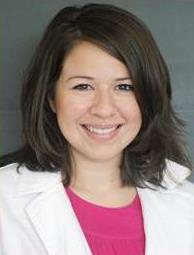Surgery resident honored for research
Dr. Mandy Wallace, a second-year small animal surgery resident at the University of Florida College of Veterinary Medicine, was honored recently by a national surgeons group for her research focusing on a possible new treatment for portosystemic shunts, a life-threatening condition in dogs.
Wallace, also a master’s degree candidate at UF, received second place in the resident research presentation category during the American College of Veterinary Surgeons annual surgery summit meeting, held Oct. 16-18 in San Diego.
Her presentation focused on her master’s project, the in vitro development of a slow occlusion device deemed to be possibly safer than existing treatments for PSS in dogs.
Portosystemic shunts are abnormalities that are present from birth in dogs and cats. In this condition, the veins circulating blood away from the gastrointestinal tract are diverted away from the liver and pass directly into the systemic circulation, leading to poor liver development and the build-up of toxins in the blood. Animals with this condition have signs such as vomiting, seizures and depression. Currently, 21 American Kennel Club breed clubs list PSS as a disease of concern in their breed. Of these 21 breeds, five — the Yorkshire terrier, Shih Tzu, miniature schnauzer, Shetland sheepdog and Pembroke Welsh corgi — were included in the top 25 of the AKC’s 2013 list of the most popular breeds in the United States. Other commonly affected breeds include the maltese and the pug.
“Additionally, we see and treat anywhere from 40 to 50 dogs per year for this disease at our hospital alone,” Wallace said.
Surgical closure of the abnormal vessel is currently the only definitive treatment for the disease, but there are problems with this approach.
“It has been shown that closing the vessel slowly rather than closing it acutely in surgery leads to better patient outcomes,” Wallace said. “Current slow occlusion devices for surgical treatment of PSS include Ameroid constrictors and cellophane banding. Both devices swell, but primarily close the abnormal vessel through inflammation and blood clot formation, which are unpredictable and can lead to post-operative complications. Additionally, the current slow occlusion devices contain metal, which prevents us from being able to perform another CT scan to determine if the abnormal vessel has closed completely in the months after surgery.”
Dr. Gary Ellison, chief of the small animal surgery service, came up with the idea of creating a new slow occlusion device that would close the vessel via physical compression of the vessel over four to six weeks.
“We collaborated with the UF materials science engineering department, specifically Dr. Christopher Batich, to identify several different swelling materials for testing to use within the ring,” Wallace said. “After numerous pilot studies, we developed a mixture of polyacrylic acid — a hydrogel used in soft contact lenses to improve wettability — and inorganic salts that would swell consistently over a four-to-six-week period. This mixture is placed within a plastic polymer outer ring encased in silicone that can go around the abnormal vessel.”
The swelling material is also encased in a silicone tubing that is attached to the outer ring, Wallace said.
“All of these materials are biocompatible and therefore, we expect will only induce minimal inflammation at the site of placement as opposed to the currently available devices,” she said. “Additionally, the materials are all radiolucent to allow for CT imaging to determine if the abnormal vessel is fully closed during recheck exams in the months after surgery.”
Wallace’s presentation consisted of in vitro studies where the rings were tested in beakers to determine their swelling characteristics and the best version of the mixture and prototype ring for surgical use in animals.
Drs. Brad Case and Stanley Kim, both small animal surgery faculty members, also played a key role in development of the prototype, along with Rick Rizzulo of DOCXS Biomedical Products, Wallace said.
In an e-mail, Ellison thanked the college’s Office of Research and Graduate Studies for helping to make Wallace’s study possible through grant funding. Additional support was provided through the Mark Bloomberg resident research fund.
“This initial pilot study support has led to other competitive grant support of in vivo and clinical trials, including a resident- in-training grant from ACVS,” Ellison said.
Wallace previously worked on a study focusing on the outcome of PSS while at her internship at Colorado State University’s College of Veterinary Medicine.
“I was very lucky that Dr. Ellison had the project idea and wanted to begin working on it, as I was starting my master’s work and my residency,” she said. “This disease is such a sad one in many respects, because we primarily find it when dogs are 4 to 12 months of age. Often these animals have recently been adopted by their owners, who are just getting to know their new puppy, only to find out that the puppy has a life-threatening condition that requires surgery.”
With surgery, however, dogs with PSS can in most cases live a long and normal life, Wallace said.
“The best moments are when they return for their 3 and 6 month postoperative rechecks, and they are completely normal, happy puppies,” she said. “I love this project and truly hope that once we can begin using these devices in clinical cases, they will improve the outcomes for our patients.”












